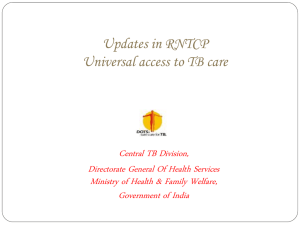Sputum induction
advertisement
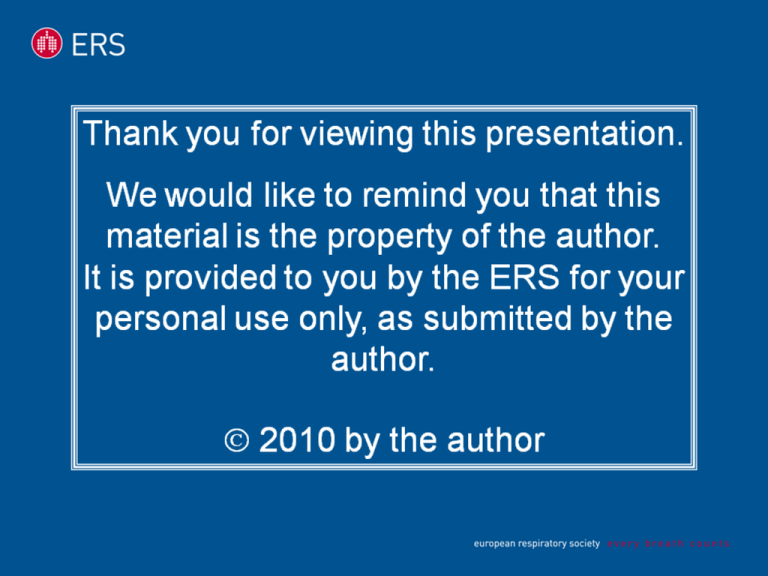
Pro and Con Session on bronchoscopy for TB diagnosis Jean Pierre Zellweger & Christoph Lange Can we avoid bronchoscopy for the diagnosis of TB by sputum induction? Sputum collection • Many patients with TB suspicion – Do not produce sputum – Produce sputum in inadequate amount or quality – Have negative smears • The tendency is to collect sputum from the site of disease (the lungs) , particularly if the patient is unable to produce sputum and bronchoscopy is available • What can be done apart from or before bronchoscopy to obtain adequate samples? Spontaneous vs instructed sputum production (1494 women and 1561 men) Khan MS, Lancet 2007;369:1955-60 induced sputum • Technique – Inhalation of hypertonic saline (3%) with ultrasonic or air compressor nebulizer (possible addition of b2 agonist) – Inhalation of vaporized 15 % aqueous saline • Yield – Adequate specimen obtained in 85 to 99 % • Indications – Cough without sputum – Unable to produce sputum – Negative sputum smear with high clinical suspicion induced sputum Yield of induced sputum among 82 patients with suspected TB unable to produce sputum or with negative sputum smear Positive smear SI Positive culture SI No sputum 13 13 Sputum smear negative 5 17 Parry CM. Tuber Lung Dis 1995;76:72-6 induced sputum • Among 1648 patients with suspected tuberculosis with poor or absent sputum submitted to sputum induction, – 558 were smear-positive • 353 previously sputum smear negative • 97 inadequate sputum • 108 unproductive cough Li LM. IJTLD 1999;3:1137-9 induced sputum Yield of repeated sputum induction among patients with proven TB but unable to produce sputum N samples Smear + (%) Culture + (%) 1 64 70 2 81 91 3 91 99 4 98 100 Al Zahrani K.IJTLD 2001;5:855-90 induced sputum • Sputum induction in 30 children with suspect TB (3 to 15 years): – 29 could bring sputum under induction • 4 were smear positive • 4 others were culture positive – Sputum induction confirmed the presence of tuberculosis in 28 % of children Shata AM. Arch Dis Child 1996;74:535-7 TB diagnosis in 140 TB suspects with negative smear or no sputum production Morse M, IJTLD 2008;12(11):1279-85 Impact of sputum collection technique on the yield of smear examination in 78 patients with C+ PTB % Chang KC, Eur Respir J 2008;31:1085-90 Impact of adding supervised and/or induced sputum collection to spontaneous sputum Chang KC, Eur Respir J 2008;31:1085-90 Sputum induction vs bronchoscopy • Sputum induction (SI) and bronchoscopy (B) among 101 patients with suspected TB but negative sputum smear • 26 patients had positive culture for M. tbc (5 by B only, 6 by SI only,14 in both, 1 in sputum) • B revealed 10 lung cancers sample Sensitivity (%) Neg. Pred value (%) Bronchoscopy 73 91 Induced sputum 87 96 Anderson C, AJRCCM 1995;152:1570-4 Sputum induction vs bronchoscopy • Prospective comparison between SI and BAL among 251 patients with suspected TB but no sputum or negative sputum smears. • 143 proven TB (94 by SI, 103 by BAL). • Concordance of bacteriological results from samples obtained by SI and BAL concordance discordance smears 98 % 2% cultures 90 % 10 % Conde MB. AJRCCM 2000;162:2238-40 Cumulative proportion of positive cultures in TB suspects with 5 induced sputum, 3 gastric washing and BAL Brown M, Clin Inf Dis 2007;44:1415-20 Yield of spontaneous and induced sputum collection and BAL in 101 migrants suspect of PTB Schoch O, AJRCCM 2007;175:80-6 Schoch O, AJRCCM 2007;175:80-6 Additional yield of increasingly invasive sputum collection techniques in 150 TB suspects Bell DJ, IJTLD 2009;13(1):99-104 Immunological diagnosis of TB (IFN- response) in induced sputum in 42 S- TB suspects Breen RAM, PLoS One 2007;2:e1335 clinical or radiological suspicion of pulmonary TB cough and sputum cough, no sputum unable to produce sputum (children) no cough, no sputum failure of sputum induction bronchoscopy available suspect of other disease sputum sm ear and culture induced sputum if sm ear negative sputum induction throat swab gastric lavage bronchoscopy and BAL bronchoscopy with BAL Conclusions: • The diagnosis of tuberculosis relies on the obtention of adequate sputum samples for microbiological (and immunological) examination • The yield of sputum collection can be greatly increased by – Instruction – Chest physiotherapy – Sputum induction • More invasive and/or expensive techniques (gastric vashings, BAL) add little to the diagnostic yield Can we avoid bronchoscopy for the diagnosis of TB by sputum induction? Here comes the truth... • Diagnostic tools for active pTB are sputum microscopy, -culture, -PCR, TST and IGRA • In more than half of the patients with active pTB no AFBs are seen on sputum stains • The diagnostic sensitivity of rapidly available techniques like PCR is limited in smear-negative cases diagnosis of active tuberculosis ELISPOT - PHA ESAT-6 CFP-10 Person A Person B cut-off: >5 SFC/250.000 PBMC sensitivity and specificity of IGRAs for the diagnosis of active tuberculosis TST ELISA ELISPOT sensitivity 77 % 74 % 90 % specificity 69 % 75 % 67 % TBNET M. tuberculosis-specific ELISPOT isolation of mononuclear cells BAL-fluid blood antigen-specific cells secrete IFN- blood Am J Resp Crit Care Med 2006 blood BAL-F Zur Anzeige wird der QuickTime™ Dekompressor „“ benötigt. Eur Resp J 2008 blood Am J Resp Crit Care Med 2009 Am J Resp Crit Care Med 2009 TB suspect medical history, imaging studies 2 (3) x sputum examinations microscopy + - + MTB-NAAT likely NTMinfection - + MTB-NAAT - likely TB +/+, +/- NTM specific NAAT* IGRA+TST TB or LTBI -/-, -/+ TB unlikely culture (sputum) Bronchoscopy# NTMinfection TB likely TB, NTM likely TB likely TB, NTM, other likely TB TB + microscopy (BAL, TBB) + NAAT (BAL, TBB) - + histology (TBB) - + IGRA (BAL) - + culture (BAL, TBB) - TB unlikely * NTM NAAT may be helpfull, when available # in accordance with WHO recommendations (WHO. Treatment of tuberculosis. Guidelines for national programmes. Geneva; 2003) clinical response to antibiotic therapy may be considered prior to further investigations, however in countries of low TB-incidence immediate further diagnosis with
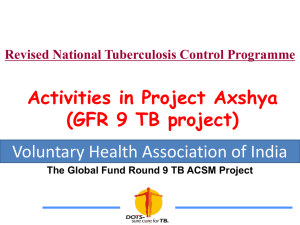
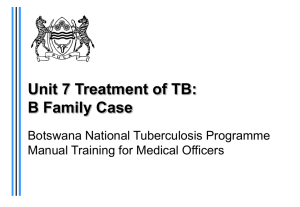
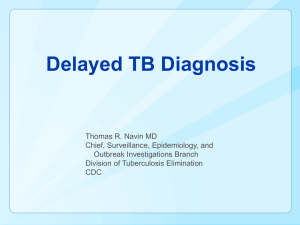
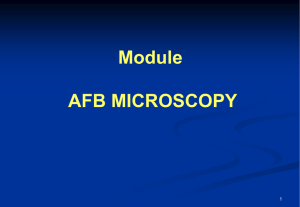
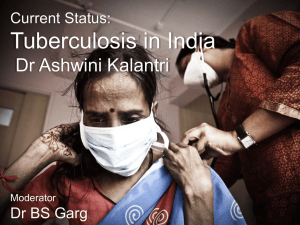
![Presentation 1 []](http://s2.studylib.net/store/data/005545985_1-90a84121db86688a94c7d4f16c3786e8-300x300.png)
